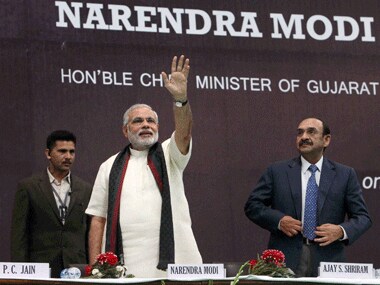BJP’s Prime Ministerial candidate Narendra Modi has said that a prospective government led by him will not be vindictive to its political opponents, not even to Robert Vadra, Sonia Gandhi’s controversial son-in-law. Yet, Modi’s supporters, or indeed all those who vote for him or any other non-Congress government, would expect some concrete action against those guilty of corruption. You cannot come to power on an anti-corruption plank and then fail to nail those you called corrupt, something Arvind Kejriwal found out in rapid time. The problem is that the line between a genuine investigation and a vindictive (politically motivated) investigation has blurred. The destruction of institutions via the erosion of their autonomy and blatant politicization of their personnel – the CBI’s credibility to take just one example is non-existent – has obstructed the cause of justice. [caption id=“attachment_1483251” align=“alignleft” width=“380”]  Narendra Modi. Agencies.[/caption] Modi has been at the receiving end, left hanging in the twilight zone between guilt and innocence by a multiplicity of investigating agencies. So, on the one hand, he has been witness to the CBI let loose to investigate his close aides (and by implication him) in several allegedly “fake” encounter cases in Gujarat. On the other hand, a Special Investigation Team (SIT) monitored by the Supreme Court has exonerated Modi of criminal culpability in the 2002 riots. The trouble is that when questions are easily cast on the “motivation” of investigating agencies, what they say is read with doubt. In the end, public sympathy turns in favour of the person being “hounded” without any real proof of guilt. What applies to Modi would equally apply to a leading Congress politician or indeed a member of the party’s first family. It will be easy for the Congress and it sympathisers to denounce any CBI inquiry instituted by a BJP-led government as a witch-hunt. What about the ‘independent’ Lokpal? Well, if the appointees to the Lokpal are made in a partisan fashion – the incumbent Congress did not deem it fit to end partisanship even on appointments where consultations with the Leader of the opposition were mandatory – then the Opposition will cry foul and question the credibility of the Lokpal as easily as that of the CBI. In the end, botched investigations into political opponents (even if they have a genuine basis) end in disaster for the ruling party. No example is better than Indira Gandhi’s bounce-back against what was perceived as a Janata Party witch-hunt so soon after the Emergency. So does that mean all politicians should be left off the hook for criminal misconduct just because the political cost of investigating them may turn out to be high? No. The right approach is to strengthen institutions to a point that their credibility is unquestioned. The first thing that Modi, or any other non-Congress Prime Minister must do (within weeks of assuming office), is to appoint a set of persons with impeccable credentials to the Lokpal. They need not all be retired judges and retired cops. The second thing it must do is to assign an independent set of investigators to the Lokpal. These persons can be on deputation from the CBI, but must not report to the CBI while at the Lokpal. They can equally be drawn from other police organisations. If the next PM is truly bold, he would go one step further and end entirely the anti-corruption role of the CBI and CVC (an independent but toothless body) and hand it over to the Lokpal. It is important to create an investigative institution which is at arms-length from the government of the day. It is in the Government’s interest. If a truly independent Lokpal then investigates an opposition politician, it will not been seen as vindictive politics. The one cost of this is that an independent Lokpal will also be empowered to investigate a politician of an incumbent Government. That is the challenge. Only the incumbent executive can implement institutional change and it may not always suit its purpose. Modi is on the right track when says that there should be no vindictiveness but he would also know that if he wins a mandate, people will want action against the corrupt. The only way to resolve the contradiction is to push radical institutional reform.
BJP’s Prime Ministerial candidate Narendra Modi has said that a prospective government led by him will not be vindictive to its political opponents, not even to Robert Vadra, Sonia Gandhi’s controversial son-in-law.
Advertisement
End of Article


)
)
)
)
)
)
)
)
)



